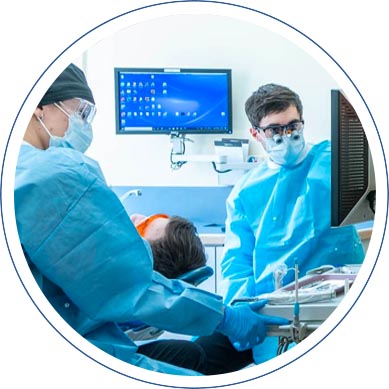Tooth Extractions: What You Need to Know
At David Eskow DDS, we prioritize your oral health and always explore your options before suggesting a tooth extraction. Nevertheless, under certain circumstances, especially with an impacted wisdom tooth or significant damage from decay or disease, we may strongly recommend an extraction.
Understanding Wisdom Teeth and Their Potential Complications
By adulthood, most individuals have 32 teeth, comprising 28 essential ones for biting and chewing, and you typically have 4 wisdom teeth or “third molars.” Located at the back of your mouth, your wisdom teeth are typically the last to pop through.
Historically, these teeth aided our ancestors in processing rougher foods although they’ve lost their relevance in modern times and today’s current food production.
Issues can arise when your wisdom teeth don’t have adequate space to develop correctly inside your mouth, leading them to become “impacted.” And that’s not good for you because impacted wisdom teeth can result in:
- Pain and discomfort.
- Misalignment or damage to neighboring teeth.
- Bacterial infections if they partially erupt, causing pain, swelling, decay, and even halitosis or bad breath.
Given these potential problems, dental professionals often advise the removal of impacted wisdom teeth at a younger age. Even if they emerge without any immediate complications, many opt for their removal to preempt potential future issues or to facilitate orthodontic treatments.
Other Causes for Tooth Extractions
Beyond wisdom teeth, several reasons might necessitate an extraction:
- Severe Tooth Decay: If a tooth is extensively decayed and beyond restoration, it may need removal to preserve the health of adjacent teeth.
- Infections: A bacterial infection affecting the tooth’s pulp might necessitate extraction, especially if it risks spreading.
- Orthodontic and Surgical Considerations: Some treatments or restorative procedures may require tooth removal to ensure the best possible outcome.
Top 3 Common Questions about Tooth Extractions
- Is the extraction procedure painful? In today’s dental world, we all use local anesthesia, which helps ensure that your extraction process is as comfortable and pain-free as possible. We want and need you to be comfortable during the procedure and will do everything to ensure you are as relaxed as possible.
- How long is the recovery process? Recovery often depends on the tooth’s location and your extraction’s difficulty. Generally, you will recover within a few days, with some patients experiencing slight discomfort, swelling, or bleeding.
- Will I need a replacement for the extracted tooth? Depending on your tooth’s location and your oral health needs, replacements like dental implants, bridges, or dentures might be suggested to restore function and aesthetics.
Health Implications of Impacted Wisdom Teeth
Not addressing impacted wisdom teeth can lead to several health issues. Your teeth might grow sideways, remain trapped beneath the gum, or cause your adjacent teeth to misalign.
Additionally, partially emerged wisdom teeth can create pockets, allowing bacteria to thrive, which could result in infections, cavities, or gum disease.
Your Journey with David Eskow DDS
We understand that the idea of extraction can be daunting. Rest assured, our team will guide you through every aspect, ensuring you’re well-informed and comfortable. Post-extraction, we will provide you with comprehensive after-care instructions to ensure a smooth recovery.
If you’re experiencing dental discomfort or wish to learn more about tooth extraction, don’t hesitate to contact our Olney dental office. Your oral health is our priority.


